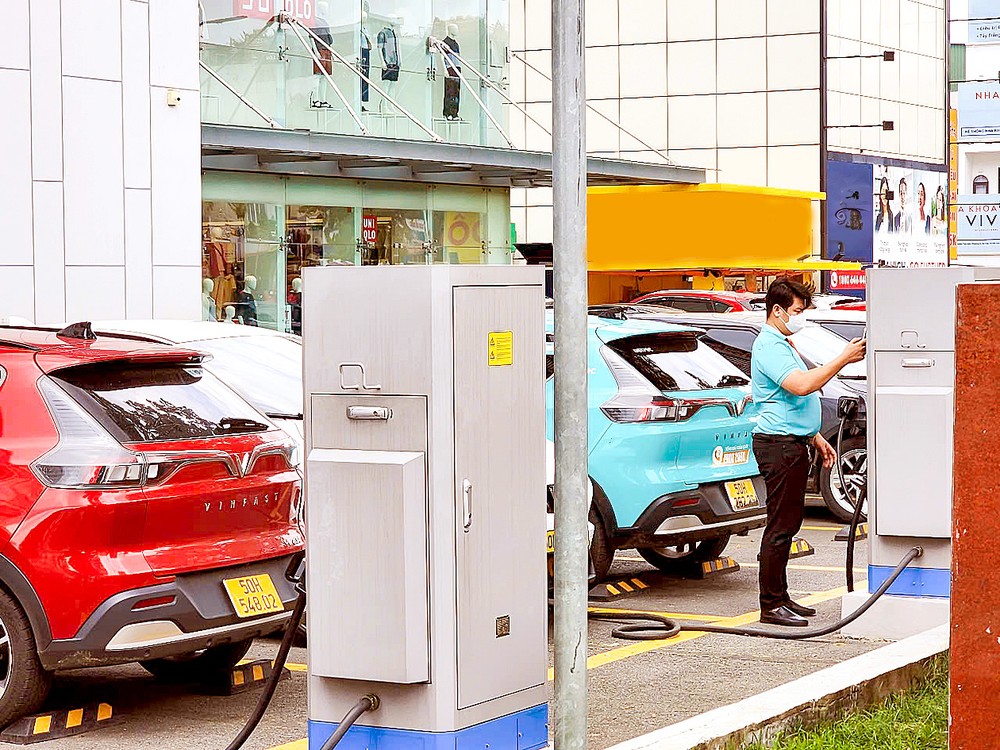
Without a strategic rollout of charging stations nationwide, the momentum behind electric vehicles could stall, posing challenges to long-term mobility and environmental goals.
According to a report from the Vietnam Automobile Manufacturers Association (VAMA), in the first six months of this year, the cumulative sales of electric vehicles from manufacturers such as Ford, Toyota, Honda, Suzuki and some non-VAMA importers reached 226,500 units, marking a significant increase of 70.2 percent compared to the same period in 2024.
Meanwhile, VinFast rolled out 67,569 electric cars in the past six months, accounting for approximately 30 percent of the total market share. BYD, the largest electric vehicle manufacturer in China, has introduced a total of six fully electric models in Vietnam after nearly a year in the market. The Vietnamese electric vehicle market is experiencing robust growth, with tens of thousands of units produced annually, and currently, around 300,000 vehicles from BYD, TMT, Hyundai, Wuling, and VinFast are on the road.
In the electric motorcycle segment, leading companies include VinFast, Dat Bike, and Selex Motors. In a short time since entering the market, electric motorcycles have seen nearly 3.5 million units in circulation. These manufacturers are striving to meet market demand; for instance, Selex is actively developing a network of automatic battery swap stations to provide customers with convenient travel options without the worry of running out of battery on the road. Dat Bike focuses on batteries that support speeds of up to 100 km/h, with a full charge allowing for nearly 300 km of travel.
In Vietnam, electric vehicle charging infrastructure is expanding rapidly with a variety of usage models. VinFast has installed over 150,000 charging poles at rest stops, shopping centers, residential areas, and public charging points in major cities. Another category includes dealership-based charging stations and home charging solutions for EV owners, such as EV One and EverCharge for public stations, and EverEV, GreenCharge, Star Charge, and Autel for home chargers.
Reportedly, charging infrastructure falls short in major Vietnamese cities. The electric vehicle (EV) charging network is currently insufficient to meet demand in major urban centers like Ho Chi Minh City and Hanoi. In Ho Chi Minh City, public charging stations are mostly concentrated in newly developed urban areas, large shopping malls, or at service points operated by automobile manufacturers. As a result, EV users especially those driving electric cars often face difficulties finding conveniently located charging stations.
There are several reasons why the development of EV charging stations in Vietnam remains limited. According to CEO Nguyen Manh Cuong of Ever EV Charging Development Company, EV charging station developers face challenges such as inadequate power infrastructure and a lack of support from electricity providers. At present, developers receive no financial assistance from the Government and must rely on investment funds, which are often difficult to access.
Communications Director at BYD Vietnam Nguyen Ha Ly shared that BYD also encounters obstacles in building charging infrastructure. In particular, finding suitable land for public fast-charging stations in major cities is not easy. The approval and legal processes for investing in charging networks are complex—especially requirements related to fire safety and grid connection. She noted that the market is still taking shape, so coordinated efforts among businesses, government, and charging service providers are essential.
Regarding electrical safety risks and the danger of fires when charging EVs in apartment buildings, Deputy General Director of Ho Chi Minh City Power Corporation Bui Trung Kien explained that while charging power for electric bikes and scooters isn't very high (except for EV cars), the risk of fire increases when multiple vehicles are charged simultaneously without proper electrical infrastructure or when using low-quality chargers and batteries. These risks apply not only to apartment buildings but also to private homes.
One key issue is the prevalence of unregulated, low-quality chargers with unclear origins, which often lead to equipment failure or fires during use. Additionally, as EV use surges, many older vehicles now face battery degradation. A particularly risky habit is overnight charging, which increases the chance of undetected and uncontrollable fires.
























